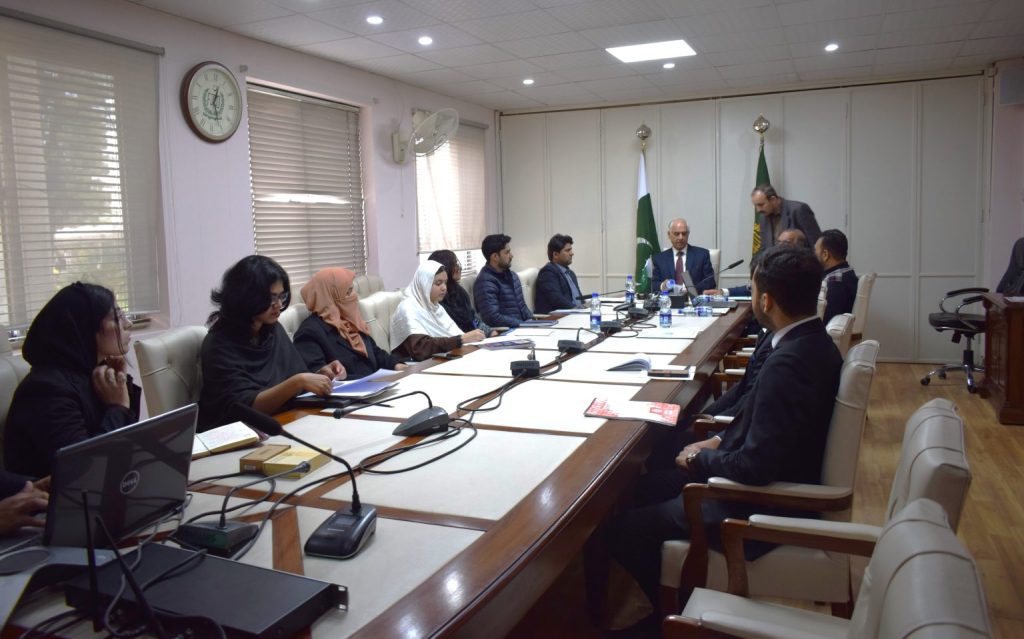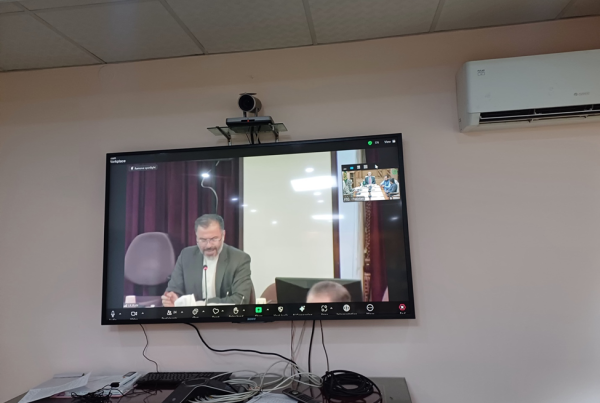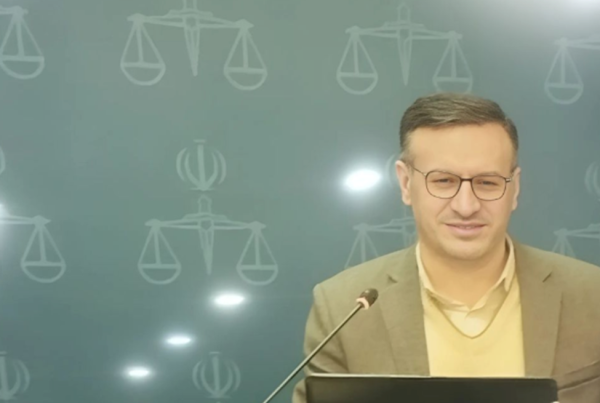On 5th March 2024 at the OICOA Secretariat in Islamabad, OICOA conducted its training session in collaboration with Forum of Pakistan Ombudsman on the topic of the most crucial aspect of an Ombudsman’s work: implementation. This session underscored that an Ombudsman office’s ability to enact meaningful change hinges on ensuring its recommendations and findings are effectively implemented.
This training session boasted an impressive gathering of participants from both national and international ombudsman offices, reflecting the global interest in enhancing the effectiveness of ombudsman institutions. With around 77 attendees, this OICOA Training Session was also offered to participants from Asian Ombudsman Association in addition to OICOA Member Institutions.
The opening remarks were offered by the Director General Trainings of Forum of Pakistan Ombudsman, Dr. Arslan Subuctageen who welcomed the 77 participants from national and international Ombudsman offices and emphasized the ombudsman’s critical function in grievance redressal. He articulated the essential process of how ombudsmen address grievances—from receiving complaints to making decisions and ensuring those decisions are implemented effectively. He stressed the importance of achieving tangible results from complaints lodged by ensuring that the implementation procedure is monitored closely and no room for delays and excuses is allowed.

Mr. Majid Qureshi, Registrar of the Federal Tax Ombudsman Secretariat, led the training and emphasized that merely issuing recommendations is not enough. Ombudsman institutions must actively monitor and pursue the execution of their decisions. He stressed the importance of timely implementation, noting, “Justice delayed is justice denied.”
He delved into the essence of effective implementation within ombudsman offices, elucidating the necessity of not just issuing recommendations but ensuring their rigorous enforcement. This focus on implementation was dissected further through discussions on the Federal Tax Ombudsman (FTO) office’s mission, legal frameworks, and strategic practices ensuring high compliance rates.
In the “Legal Infrastructure of Implementation” section of the Training Session, Mr. Majid Qureshi provided a detailed discussion on the pivotal legal frameworks that underpin the operation of the Federal Tax Ombudsman (FTO) in Pakistan. He elaborated on how these legal documents empower the FTO to address grievances effectively, ensure adherence to its directives, and enforce compliance with its recommendations. The session covered three key pieces of legislation that collectively form the legal backbone enabling the FTO to perform its duties as per the powers vested by law.
The legal infrastructure supporting the implementation of the Federal Tax Ombudsman (FTO)’s recommendations in Pakistan is grounded in three primary legal documents, which collectively empower the FTO to effectively address grievances and ensure compliance with its directives. The Federal Tax Ombudsman Ordinance (2002) forms the core legal basis for the FTO’s operations, detailing the issuance of recommendations (Section 11), addressing defiance of these recommendations (Section 12), and granting the FTO power to punish for contempt (Section 16), thereby ensuring entities adhere to its decisions.
Further legal support comes from the Federal Ombudsman Institutional Reforms Act 2013 (FOIRA), which enhances the FTO’s capabilities for institutional reform and efficient functioning through specific sections outlining its powers and responsibilities. Additionally, the Federal Ombudsman Investigation and Disposal of Complaints Regulations, 2001, provides detailed procedural guidelines for the investigation and resolution of complaints, specifying the process through Regulations 25, 26, and 27.
Together, these legal instruments ensure that the FTO is well-equipped to carry out its mission of addressing taxpayer grievances, improving the tax administration system, and upholding principles of justice and accountability within Pakistan’s fiscal governance framework. This comprehensive overview provided by Mr. Qureshi highlights the importance of a robust legal infrastructure for the effective functioning of the FTO.
Mr. Majid Qureshi also provided an insightful analysis on why the FTO has been notably effective in implementing its findings and recommendations. He said that the implementation cell at the FTO Secretariat, which sends advance reminders to tax authorities, ensuring a high rate of compliance before deadlines approach. The introduction of advance reminders, following the issuance of a new order and before the expiry of the implementation deadline, has significantly improved compliance rates. Furthermore, the transition to issuing electronic orders has streamlined communication, ensuring that relevant parties receive orders promptly, which has notably reduced excuses for non-compliance and enhanced the overall efficiency of the implementation process. This structured and systematic approach, bolstered by the legal framework, underscores the FTO’s commitment to justice and the effective redressal of taxpayer grievances, setting a benchmark for ombudsman offices in terms of implementation success.
During the session, Mr. Qureshi also shed light on the challenges faced by the FTO in the process of implementing its decisions. A significant hurdle mentioned was the lack of response and cooperation from the tax office, which often resulted in delays in taking action unless followed up by the FTO itself. This was compounded by excuses from tax offices claiming not to have received the implementation notices, which necessitated a shift towards electronic orders to improve tracking and accountability. The implementation of e-Orders in 2013 was a strategic move that helped overcome these challenges by ensuring immediate receipt of orders by the relevant officials, thereby eliminating delays in action. Another challenge highlighted was the absence of compliance reports even after deadlines had passed, necessitating the use of reminders and advance reminders to ensure actions were taken. These challenges underline the importance of proactive measures and the adaptation of technology in overcoming procedural hurdles, enhancing the effectiveness of the FTO’s mandate to ensure timely justice for taxpayers.
Mr. Qureshi also emphasized the role of Monthly Performance Reviews (MPR) as a cornerstone for ensuring effective implementation of the Federal Tax Ombudsman’s decisions. The MPR serves as a critical mechanism for accountability and monitoring, where all advisors of the FTO gather to review the status of recommendations’ implementation. This process not only allows for a comprehensive overview of pending cases but also holds each advisor responsible for explaining any delays or pendency directly to the Honorable FTO. The introduction of such a vigilant monitoring system has been instrumental in identifying bottlenecks and ensuring that the recommendations made by the FTO are acted upon in a timely manner. By maintaining a regular schedule of performance reviews, the FTO ensures a continuous focus on the efficiency and effectiveness of its operations, thereby reinforcing its commitment to upholding principles of justice and accountability in the tax administration system.
During the interactive segment of the OICOA Training Session, participants from various regions posed insightful questions, highlighting the global relevance and challenges of implementing ombudsman recommendations. Mr. Majid Qureshi’s responses shed light on practical solutions, legal frameworks, and the strategic measures adopted by the Federal Tax Ombudsman (FTO) office to ensure effective implementation and compliance.
Mr. Asep Cahyana (Assistant Ombudsman of Indonesia) inquired about the procedures for reporting non-compliance to the President or Parliament and possibilities of making such reports public for broader awareness.

To his response, Mr. Qureshi elucidated that in cases of defiance, a structured protocol involving explanation letters, show-cause notices, and ultimately, reporting to the President is followed. The FTO ensures transparency by publishing proceedings, including actions taken against non-compliant officers, in newsletters and on its official website in addition to circulation in print and electronic media, thereby serving as a deterrent and fostering public awareness.
Ms. Umme Salama asked about the extremities of actions taken by the FTO against non-compliance, curious about past instances and outcomes. Highlighting the rarity yet seriousness of contempt proceedings, Mr. Qureshi recounted only a couple of instances where such measures were necessitated. These cases involved direct defiance of FTO orders, leading to potential imprisonment and dismissal of a Member (Legal) of Federal Board of Revenue which was thwarted later onwards when that person issued an unconditional written apology to the Honorable Federal Tax Ombudsman of Pakistan, hence emphasizing the FTO’s commitment to enforcing its recommendations and the severe repercussions for non-compliance.
A participant from the Office of Ombudsman of Macao was interested in the statistics related to non-compliance encountered by the FTO in 2023 and the common reasons provided by agencies for such failures. Mr. Qureshi noted a 6% non-compliance rate, attributing it mainly to cases sub judice or at a stage of representation filed before the President of Pakistan, which temporarily halt implementation processes. Another participant from Macao asked about FTO’s policy regarding publishing names of the officials involved in defiance of recommendations and findings to which Mr. Qureshi responded that while the FTO is committed to publicizing the proceedings and outcomes of its findings/recommendations, it refrains from publishing the names of non-compliant officers, opting instead to mention their designations. This approach is taken to maintain a balance between ensuring accountability and upholding ethical standards. By avoiding the direct public naming of individuals, the FTO seeks to preserve professional dignity while still highlighting areas and instances of non-compliance. This policy reflects a nuanced understanding of public accountability, focusing on systemic issues rather than individual blame, and promoting a culture of responsibility within the tax administration framework.
A participant from the Office of Ombudsman of Indonesia queried about the methodologies for assessing the effectiveness of implementation and monitoring progress. Mr. Qureshi introduced the Complaint Management Information System (CMIS) as a crucial tool for tracking complaints and their implementation status, illustrating the proactive measures taken by the FTO to ensure compliance, including periodic reviews and direct accountability mechanisms.
Masood Ishrat, the Registrar for the Sindh Ombudsman, inquired about the procedural aspects of issuing show-cause notices. He was particularly interested in understanding the approval process and the specific language and format requirements for these notices, which are crucial for enforcing compliance with ombudsman recommendations.
Responding to the query, Mr. Majid Qureshi clarified that the issuance of show-cause notices indeed requires the Ombudsman’s approval, emphasizing the importance of maintaining procedural integrity and legal correctness. He also pointed out that a prescribed format given in ‘Form-H’ which must be followed, ensuring the notices are clear, legally sound, and effectively communicate the issues and potential consequences of non-compliance.
As the training reached its conclusion, Dr. Arslan Subuctageen extended his sincere thanks to all the participants for their active engagement and valuable contributions throughout the session. He particularly appreciated the insightful questions raised, which not only deepened the discussions but also highlighted the shared commitment to advancing the effectiveness of ombudsman offices worldwide.

This OICOA Training Session in collaboration with the Forum of Pakistan Ombudsman served as a powerful reminder that the work of an Ombudsman does not end with a decision. Effective implementation is paramount to upholding justice and ensuring that the grievances of citizens are genuinely addressed. By building robust monitoring systems, leveraging technology, and collaborating across borders, Ombudsman offices can maximize their impact and ensure that the complaints and grievances of citizens are not only heard but truly resolved.






